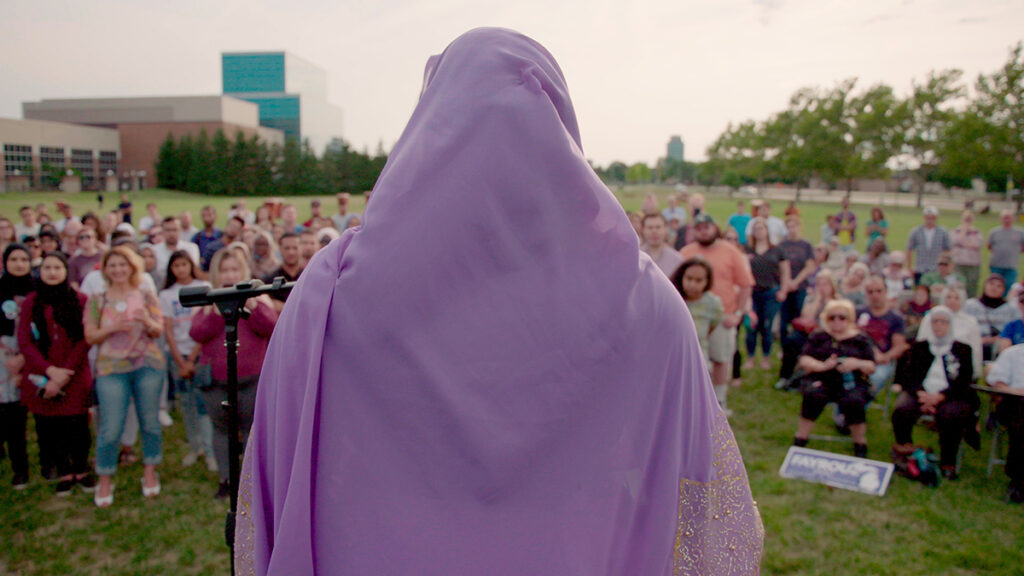Nausheen Dadabhoy is a Pakistani-American director and cinematographer whose work spans fiction and documentary. She lensed an Oscar-nominated live action short film, an Emmy-winning feature documentary, and films that have played at Sundance, TIFF, and Locarno, and on Al Jazeera, HBO, and PBS. “The Ground Beneath Their Feet,” her directorial debut following two Pakistani women who were paralyzed after an earthquake, premiered at IDFA. Dadabhoy has been a Film Independent Project Involve Fellow, Berlin Talents participant, Firelight Fellow, Chicken & Egg (Egg)celerator Lab Fellow, newportFILM Documentary Cinematography Fellow, Soros Equality Fellow, and she is currently a Pillars Artist Fellow.
“An Act of Worship” is screening at the 2022 Tribeca Film Festival, which is taking place June 8-19.
W&H: Describe the film for us in your own words.
ND: “An Act of Worship” tells the story of the last 30 years of Muslim life in America from the perspective of Muslims.
W&H: What drew you to this story?
ND: I am a Muslim American, and I have wanted to tell stories about the truth of my community’s experience since 9/11 because there are very few depictions of Muslims on-screen that have been created by Muslim storytellers.
W&H: What do you want people to think about after they watch the film?
ND: This film is about an emotional journey, so I want the audience to be moved. If they are Muslim I want them to feel like they have seen their experiences reflected back to them. If they are non-Muslim I hope we’ve opened a window into the reality of Muslim life in America.
W&H: What was the biggest challenge in making the film?
ND: Gaining access. The Muslim community has been so misrepresented in the media that people were really skeptical of us even though we are a largely Muslim filmmaking team. We spent many months traveling across the U.S. meeting different organizers and community leaders and built trust with them before we started filming.
W&H: How did you get your film funded? Share some insights into how you got the film made.
ND: Our film has been made almost entirely with grant funding. We received our first grant when we responded to a call for stories about communities that would be impacted by the Trump Administration. That short, also called “An Act of Worship,” was made with support from Firelight Media and Field of Vision and was about the immediate organizing that happened around the Muslim Ban. We used that as a proof of concept to raise funds for the feature.
W&H: What inspired you to become a filmmaker?
ND: I watched “Trainspotting,” and it’s still one of my favorite films, it immerses the viewer in the character’s experience through a really inventive use of form, and as someone who is into comic books and visual storytelling, it really drew me in. I wanted to be able to do that.
W&H: What’s the best and worst advice you’ve received?
ND: Best advice: You’re only in a race with yourself.
Worst advice: It’s never too late to become a doctor. That’s from my mom!
W&H: What advice do you have for other women directors?
ND: I think that for a lot of us making a film can become all-consuming, and I try to remember that I am more than my work and more than my film. I think that’s important to remember, especially for women and nonbinary people, because we face a lot of rejection and it can feel personal. But we are more than our films, and even our films and our creatives voices are more than what the marketplace is defining them.
W&H: Name your favorite woman-directed film and why.
ND: “Monsoon Wedding” by Mira Nair. That film is very representative of my experience as a Pakistani-American, as well as being perfect in terms of craft.
W&H: How are you adjusting to life during the COVID-19 pandemic? Are you keeping creative, and if so, how?
ND: I started painting during the pandemic, and it not only helped me flex new creative muscles, it also helped my mental health quite a bit.
W&H: The film industry has a long history of underrepresenting people of color onscreen and behind the scenes and reinforcing — and creating — negative stereotypes. What actions do you think need to be taken to make Hollywood and/or the doc world more inclusive?
ND: I think we need more people from marginalized communities to tell their own stories, but I also think we need more people to support them to do that. That doesn’t just mean resources — it also means giving people the space to tell the kinds of stories they want to tell and to use the form in ways that are true to the narrative they are creating.







